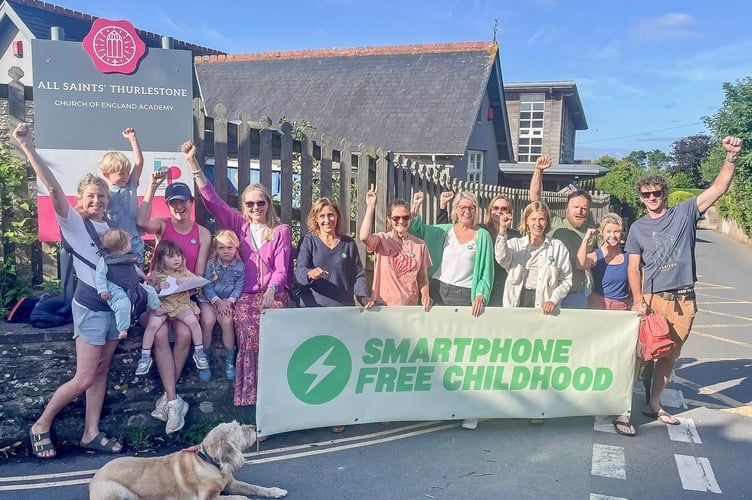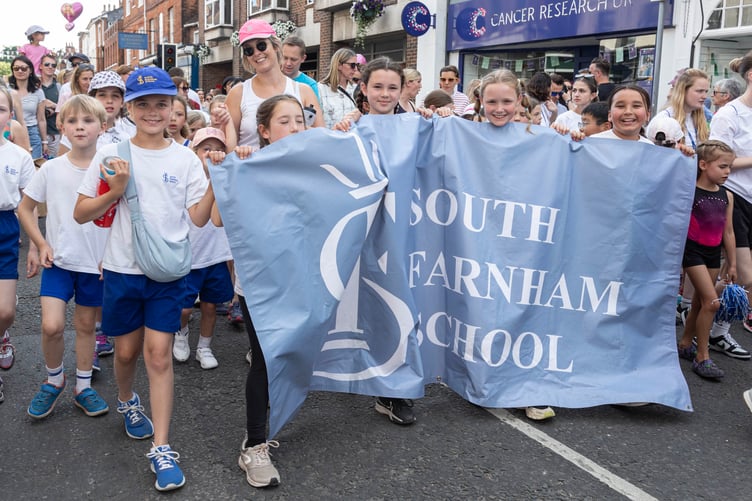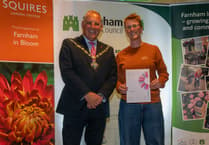“We’ve seen children bringing in board games, playing UNO and making daisy chains – it’s been a return to what childhood should be.”
These were the words of a deputy headteacher of a primary school in Bournemouth last month.
The “uplifting” and “brilliant” change at St Peter’s Catholic School was the result of a ban on smartphones for Year 7 pupils, with teachers seeing a “massive uplift” in pupils arriving early and engaging in traditional play.
But the Dorset school hasn’t been alone, as a grassroots campaign to draw kids away from smartphones is growing by the day – with Farnham schools and parents at the forefront in Surrey.
In Mid-September Ros Maree and Debbie Warner asked Farnham Town Council to support the Smartphone Free Childhood (SFC) campaign, with the response being a resounding “yes”.
In the campaign’s own words, SFC isn’t about banning tech or turning back time. It’s about giving children more of what really matters – time, connection and the freedom to be kids. If you were born before the 90s, just think how different your childhood would have been if you had a mobile phone when you were growing up.
People who sign up collectively agree to delay giving smartphones to children, especially at primary school age. Because it’s not hard to see to the impact they’ve had, with smartphones being linked to a rise in teenage mental health issues and a drop in learning, friendships and focus.
The success of the campaign locally has been eye-opening. Around 9,000 have signed up in Surrey with Farnham accounting for around an eighth of that figure.
“We’re part of a national grassroots collective that has seen local parents coming together who would like a bit more freedom to choose around the phones they give to children,” said Roz during a get-together at Morley Road recreation ground last week.

“At the moment 89 per cent of children aged 11 to 12 have all internet access in their pocket.
“It makes a lot of parents feel a lot of peer pressure.
“At the heart of the problem are these big tech companies whose projects are driven by capturing and holding our children’s attention - they’re careless with children’s wellbeing.
She added: “While children are spending demonstrable amounts of time on smartphones there’s a huge loss of time in terms of what they should be doing at that age, like seeing friends, exploring the world and having real world experiences.”
Nelly Hare was one of several parents the Herald spoke to last Monday at the meet-up. She has her own smartphone addiction to deal with, so she doesn’t want her child to get caught in the same trap.
She said: “I think it’s frightening for me, as a parent.
“I worry about my child and smartphones. They’re not mature enough to make their own decisions they but they get influenced by social media.
“My friends told me about this campaign and I thought it’s such a good initiative.
“I think it’s a good movement to be part of. It’s from the parents and one you can do something about.”
There was some debate among parents about who should be taking the lead in restricting smartphone use among kids. Some believe the government should be tougher, while others feel it begins with parents and schools setting a tough stance early on in life.

“I think there needs to be pressure on the school system to change, especially at secondary schools,” said Katie Bath, who has a six-year-old child.
“I was so surprised phones are even allowed to be in secondary schools. It’s got to be a massive distraction.”
“I think the government is being too slow to address it – their attitude is ‘we’re not worried about what parents think’ and it stinks,” said Adela Buglass.
“I’ve got friends all around the world and their children start school later than in Britain. They start much earlier here so problems like this are so much more engrained and start earlier.”
Many of the parents spoke of peer pressure, with children wanting to be with the “in crowd” and having the same or better phone as their friends. Sasha Berry started getting the pressure when her daughter was in Year 5.
She said: “As we got to the end of Year 5 it ramped up and by Year 6 I was well up against it – it was extremely stressful and I’m sure it’s the same for other parents.
“They also see all this stuff on social media and TikTok. Some of it is really unsuitable and serious and I don’t want my daughter to even have a phone.
She added: “When the SFC campaign started it opened my eyes. It was quite shocking hearing and reading all these stories.
“I think we’ve got to go right back to basics. No cameras or apps, just a phone to text or make calls.”
“We know what these tech guys are doing and how devious they’re being. They wouldn’t dare give their children a smartphone,” said Gary Keller.

“We’ve spoken to Greg Stafford about this and a lot of people on the group have been to Number Ten.”
Anyone who drove past South Farnham School before the summer holiday may have noticed the “this is a phone-free school” posters on the fence.
The school is top of the class in Farnham when it comes to the Parent Pact. Parents who sign up have agreed to take collective action, moving kids away from smartphones to simple “brick-like” phones for calls and texts.
Some 1,122 parents in Farnham have signed up at the time of writing, with South Farnham School leading the way at 239 signatures. St Peter’s Wrecclesham and Potter’s Gate Primary aren’t far behind with 201 and 185, respectively, while the figures for Rowledge Primary, St Polycarp’s, William Cobbett and Highfield South Farnham are in three figures or close to 100.
Weydon, by contrast, only has 49 but their smartphone policy is reportedly being reviewed.
“In recent years we have noticed a change in pupils' ability to focus and in their perseverance and commitment to problem solving,” states the letter sent by St Peter’s to parents, encouraging them to sign up.
“Other schools have similar feedback. We have also over the past two years, had to deal with social media posts which happened outside school, but which caused considerable upset to those at the receiving end.
“Based on these facts, we are happy to support this campaign but recognise that the decision of course lies with individual families.
“The Parent Pact helps support collective action, moving to simple phones for calls and texts. With less time being spent looking down at apps, there's more time for real conversation, for friends to really engage with each other and to make real-life memories.”
Sarah Oliver, headteacher of Rowledge Primary School, is a backer and the anti-smartphone policy is definitely making a difference. Teachers are told to use phones as a last resort, while parents are encouraged not to use them at drop-off and pick-up time, because it sets an example.
She said: “I think educating parents from Year Reception onwards is key so children don’t start too early.”
For more details visit www.smartphonefreechildhood.org





Comments
This article has no comments yet. Be the first to leave a comment.